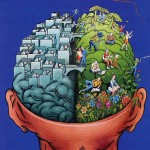 I read a joke on Facebook, a witty play on words:
I read a joke on Facebook, a witty play on words:
My left brain has nothing right,
My right brain has nothing left.
The wit obviously lies in intentionally confusing two pairs of homophones, namely left as a direction and left as the past participle of leave, and right as a direction and right meaning proper and correct.
After a smirk or two, my inquisitiveness compelled me to ask questions. Are these words homophones by chance, or are they actually related to each other somehow?
Upon reflection the right hand indeed has a lot of positive connotations associated with it. Christians say Jesus sits on the right hand of God after his ascension. Islam says on the Day of Jugdement, a Muslim will receive a book detailing all his good deeds in his right hand from Allah, and a book detailing all his bad deeds in his left hand. Indians traditionally eat only with their right hand and consider the left hand dirty, because before there was toilet paper they wiped themselves with their left hand. In western esoterism, practitioners distinguish between two different types of magic. The Right-Hand Path leads to benign White Magic, while the Left-Hand Path leads to evil Black Magic. Even today we shake hands with our right hand to symbolize friendliness. It is therefore not a bad hypothesis to propose that right as in the right hand and right meaning proper in fact share a common origin.
As a matter of fact, the sense of right meaning “opposite of left” indeed derives from the other sense, meaning proper, good and normal. The right hand has always been perceived to be the proper and natural hand, it is the right hand to use for anything important, hence the name. It obtained this meaning in as late as the 12th century. The right meaning “correct”, from Old English riht, is a much older word which has cognates in a number of other European languages, including Latin rēctus ‘straight’ and German recht ‘right’. Before this word came to mean the opposite of left, the original word in Old English was swiþra, which literally means “stronger”.
This in fact echoes the development of the words left and right in many other languages. Here is a quick survey of several major European languages:
| English | left | right |
| French | gauche | droit |
| Italian | sinistra | destra |
| German | link | recht |
| Greek | αριστερός aristeros |
δεξιός dexios |
| Russian | левый lyevyj |
правый pravyj |
In French, gauche can be used to describe someone who is awkward and tactless. The word has entered English and means the same thing. The related French verb gauchir means “to deform”. The Italian word sinistra is related to English sinister, its verbal form sinistrare means “to damage”.
The French word for “right”, droit, on the other hand, shares the same origin with Italian destra, Greek dexios and English dexterity and originally means skillful. It can be further traced to the Latin word dīrēctus, which ultimately derives again from rēctus. Both droit and the related form adroit have entered English.
Both German link and recht are related to their corresponding words in English. English left comes from Old English lyft “weak, foolish”. German link comes from an Old High German word related to English slink. They are both related to Latin laevus, meaning “foolish”. Recht and right, as discussed above, originally mean “straight”, the sense of properness and correctness hence follows.
Greek aristeros means “the better one”. It is related to arist- in aristocracy, which means “ruling by the best”.
Russian lyevyj, unsurprisingly, is also related to Latin laevus, meaning “foolish”. In modern colloquial usage, it can be used to describe something illegal. The word for “right”, pravyj, as in English, can also mean “correct”.
The left as the past particle of leave, however, is unrelated to the directional left. Leave comes from Old English læfan, which means “to remain”, and is related to life and live.


Perhaps the same reasoning as the Indians lies in the choice of Chinese characters for “right” and “left”:
右: right: hand to mouth
左: left: hand doing the work (wiping bottom)
Pretty interesting. I can´t stop reading your blog.
The word ‘right’ as in human rights also seems to be related as right (as in the opposite of left) and human rights are the same word in French also (droit)